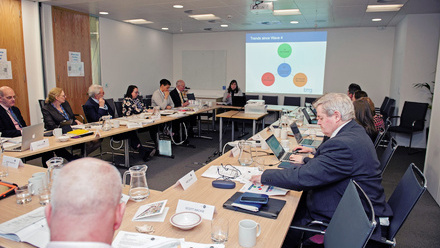News from Council – 25 June 2025
The General Optical Council (GOC) held its second Council meeting of the year on 25 June 2025. The agenda included discussing and approving the GOC’s response to its business regulation consultation and approving draft new standards guidance for registrants for the purposes of public consultation.
The Optical Consumer Complaints Service (OCCS)’s annual report, the GOC’s upcoming public perceptions survey and qualitative lived experience research, and an evaluation of the 2022-24 Continuing Professional Development (CPD) cycle were also discussed.
Response to business regulation consultation
Council approved the GOC's response to its business regulation consultation.
The consultation took place between October 2024 and January 2025 and sought views on an updated framework of regulating businesses.
The GOC’s response states that all optical businesses, as well as charities and university eye clinics, providing specified restricted functions, should be regulated by the GOC for public protection purposes.
Responsibility for agreeing the changes outlined in the response rests with Parliament through legislative reform, and the pace and outcome of any changes will be determined by the UK Government.
Council agreed that all registered businesses should have a head of optical practice, a nominated individual with overall responsibility for meeting the GOC’s regulatory standards. It also agreed that business registrants should be required to participate in a mediation service for consumer disputes.
The GOC has decided not to ask for the power to visit a business during a fitness to practise investigation. Council acknowledged benefits to this power but also highlighted concerns; for example, a lack of clarity on how this power would be used and issues around costs. It was stated that the GOC could revisit this issue in the coming years if deemed necessary.
The GOC received 99 responses to the consultation, largely from GOC registrants and organisations representing their interests, and also commissioned research from patients and the public.
The GOC aims to publish its full response to the consultation in July 2025.
Consultation on new guidance for GOC registrants
Council approved the proposal to consult on draft guidance on the care of patients in vulnerable circumstances and on maintaining appropriate sexual boundaries.
The guidance will support registrants in meeting the GOC’s new Standards for registrants, introduced in January 2025, which underline the importance of identifying and responding to the needs of patients in vulnerable circumstances, as well as maintaining appropriate sexual boundaries with patients and colleagues.
The guidance on care of patients in vulnerable circumstances acknowledges that a series of factors combine to shape vulnerability including an individual’s personal characteristics, life circumstances, as well as the actions of eye care professionals and businesses.
The guidance encourages practices to make prospective patients aware of issues that might create access barriers (e.g. stairs), and outlines the role of businesses in alerting patients to their eligibility for financial support (e.g. free tests).
The guidance on maintaining appropriate sexual boundaries provides further clarity on why registrants must not treat patients with whom they are in a sexual relationship, and considers boundaries between registrants.
The public consultation will begin in Summer 2025.
OCCS’s Annual Report 2024-2025 - ‘Resolving complaints in a changing consumer landscape’
Council discussed the annual report from the OCCS, an impartial mediation service for consumers and optical practices funded by the GOC and operated by Nockolds Resolution.
The report shows that 27% of complaints made to the GOC have been successfully referred to the OCCS for a mediated resolution. There was a decrease of 4.3% in the volume of complaints received by the OCCS in 2024-25 (1,679 received compared to 1,755 received in 2023-24). However, the OCCS has maintained a strong resolution rate, with only 49 unsuccessful mediations in 2024-25 (3% of all complaints vs 21% of all complaints in 2023-24).
Other aspects of the report highlighted in the meeting include:
-
complaints about domiciliary care having decreased to 53 this year; after an increase from 42 complaints in 2022-23 to 98 in 2023-24;
-
cataract-related complaints having increased by 70%, often due to communication issues leading to increased anxiety amongst patients and seeking a second opinion.
Council complimented the OCCS on their work over the year and particularly praised their proactivity in sharing their insights to GOC registrants through CPD sessions and other awareness-raising activities.
The full report will be published on the OCCS website shortly.
Public perceptions survey and qualitative lived experience research
Council discussed findings from two pieces of GOC research: the GOC’s 2025 public perceptions survey and qualitative research exploring the lived experiences of vulnerable groups accessing and using eye care services.
Council welcomed the findings which show that satisfaction with the overall experience of an opticians/optometrist practice remains high. However, concerns were expressed around findings showing a low awareness among those with vulnerabilities of the benefits of regular sight tests/eye examinations, and costs deterring vulnerable groups from accessing eye care services.
The GOC has already started using its regulatory powers to support more vulnerable patients, for example, through its new Standards and guidance on the care of patients in vulnerable circumstances (see above). There was a discussion amongst Council members about how far the GOC could go in promoting public health messages and access to eye care services without going beyond its statutory remit.
Both reports, with full data tables and infographics, will be published in July 2025.
Evaluation of CPD cycle 2022-24
Council welcomed an evaluation of the 2022-24 CPD cycle.
The evaluation states that the cycle should be judged as successful based on fewer registrants failing to meet their requirements compared to the previous cycle, especially as registrants needed to adapt to significant new requirements. The end of cycle processes went smoothly, and there were fewer disputes and exceptional circumstances applications when compared to the previous cycle.
Council members stated that there should be a further push around self-directed CPD, introduced in 2022, which only accounted for 4% of total CPD points logged.
It was also noted that some registrants joining the register at the end of the cycle were confused about their requirements, and that communications should be tailored to this group at the end of the current 2025-27 cycle.
The evaluation will be used by the GOC to inform future planning and reforms for the next 2028-30 CPD cycle.
Read the full June 2025 Council papers.





